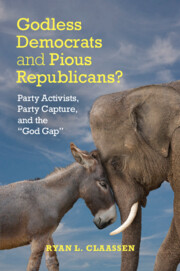Book contents
- Frontmatter
- Dedication
- Contents
- Figures
- Tables
- Acknowledgments
- Introduction
- 1 The Religious Divide in American Politics
- 2 Mobilization, Capture, and Misunderstood Trends
- 3 Representation and Four Forces that Shape Change Among Activists
- 4 First Force, The Effect of Being Fruitful and Multiplying
- 5 Second Force, The Effect of Voting Early and Often
- 6 Third Force, The Effect of Picking a Side
- 7 Fourth Force, The Effect of Writing Checks and Knocking on Doors
- 8 “Capture” Revisited, Representation, and Religious Activists
- 9 Conclusion
- Appendix A Coding for the Major Religious Traditions
- Appendix B Frequencies for Change Factor Computations
- Appendix C The Raw Materials for Assessing the Role of Demographic Change in the Activist Pools
- Appendix D Voter Loyalty Trend Estimates with Additional Control Variables
- Appendix E Republican Voter Loyalty Among Evangelicals and Region Versus Religion
- Bibliography
- Index
7 - Fourth Force, The Effect of Writing Checks and Knocking on Doors
Published online by Cambridge University Press: 05 June 2015
- Frontmatter
- Dedication
- Contents
- Figures
- Tables
- Acknowledgments
- Introduction
- 1 The Religious Divide in American Politics
- 2 Mobilization, Capture, and Misunderstood Trends
- 3 Representation and Four Forces that Shape Change Among Activists
- 4 First Force, The Effect of Being Fruitful and Multiplying
- 5 Second Force, The Effect of Voting Early and Often
- 6 Third Force, The Effect of Picking a Side
- 7 Fourth Force, The Effect of Writing Checks and Knocking on Doors
- 8 “Capture” Revisited, Representation, and Religious Activists
- 9 Conclusion
- Appendix A Coding for the Major Religious Traditions
- Appendix B Frequencies for Change Factor Computations
- Appendix C The Raw Materials for Assessing the Role of Demographic Change in the Activist Pools
- Appendix D Voter Loyalty Trend Estimates with Additional Control Variables
- Appendix E Republican Voter Loyalty Among Evangelicals and Region Versus Religion
- Bibliography
- Index
Summary
Prior work generally assumes mobilization – or change in rates of activism in a group – serves as the engine that drives change in the activist pools. Clearly, a group must field activists in order to be represented in an activist pool. However, the representation-based model demonstrates that a group can increase its presence in an activist pool without a mobilization. For example, if a group doubles in size, its numbers in an activist pool will double even if the rate of activism within the group remains unchanged. Likewise, a group might double its rate of activism but realize no additional activists if the size of the group is halved. Contrary to the assumption that mobilization drives change in the composition of the activist pools, the previous chapters of this book reveal that other macro-political phenomena wield substantial power over the composition of the activist pools. The strong influence of basic demographic forces in the first stage of the representation-based model reveals a fundamental flaw in the bedrock of mobilization-based approaches to understanding the composition of the activist pools. In the case of the rise of Evangelical activists in the Republican activist pool, virtually all variation has already been accounted for and mobilization at the last stage may prove wholly unimportant, Christian Right Thesis notwithstanding.
Nevertheless, unexplained variation remains for other groups. Although questions will be raised about the motivations implied by the Secular Backlash Thesis, mobilization will prove to be an important (although not nearly dominant) part of the story for Secular activists. Also, it will become apparent that the Christian Left has not abandoned political activism. Rumors of the demise of an Evangelical Left – in particular – are much exaggerated and Democratic Evangelicals counter voter loyalty losses with redoubled campaign activism. In order to examine the role of campaign activism shaping the activist pools, this chapter documents activism trends among Democratic and Republican partisans in each of the major religious traditions and again deploys counterfactual analyses. Also, following the pattern of the previous chapters, the forces moving groups into action are investigated.
- Type
- Chapter
- Information
- Godless Democrats and Pious Republicans?Party Activists, Party Capture, and the 'God Gap', pp. 116 - 133Publisher: Cambridge University PressPrint publication year: 2015



